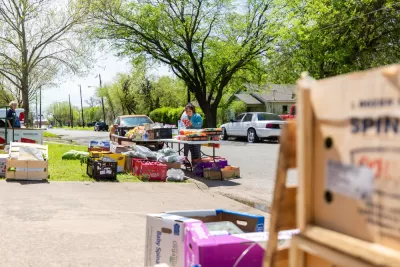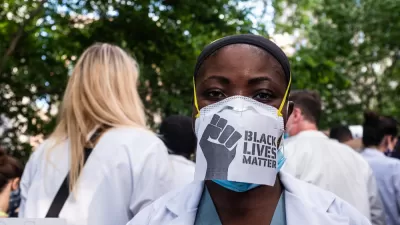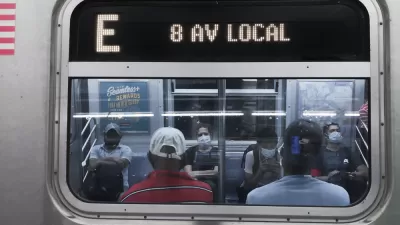What would a crisis response that finally overcomes the history of slavery and structural racism in the United States look like?

The effects of the coronavirus have not been equal across race and class lines—in public health outcomes as well as economic outcomes. Perhaps more than ever before, the consequences of structural racism are on full display every single day in the United States, as more people of color lose their jobs and their lives at a higher rate than the general population in every corner of the country.
Stephen F. Gray, assistant professor of urban design at the Harvard Graduate School of Design and a founder of the Boston-based design firm Grayscale Collaborative, writes an opinion piece for Next City on how planners, designers, and policymakers can use those lessons to fight for intentionally antiracist policy agendas.
History hasn't been enough to divert from the status quo, according to Gray.
Though the COVID crisis has put the lethal legacy of slavery on full display, the CDC only recently started collecting and disaggregating data by race. Their slowness to act decisively is either from political embarrassment, willful ignorance, or ambivalence to the immediate and life-saving significance of this information, and so when the US President and many in his political party push to reopen the economy prematurely, we shouldn’t be surprised. Once again, economic concerns in this country are taking priority over public health concerns and human life, as they often do when black and brown people are involved.
So now, more than ever, is the time to take action, according to Gray, "to ensure that a post-COVID-19 recovery benefits both sides of the color-line and that we as a nation truly begin to address the structural roots of racial inequality."
Gray has some specific recommendations for achieving that kind of ambitious change. Ideas include, with a lot more detail provided in the source article, specific recommendations for housing policy, economic development, and the public domain.
FULL STORY: COVID-19 Puts Structural Racism On Full Display — Will We Finally Do Something to Correct It?

Alabama: Trump Terminates Settlements for Black Communities Harmed By Raw Sewage
Trump deemed the landmark civil rights agreement “illegal DEI and environmental justice policy.”

Planetizen Federal Action Tracker
A weekly monitor of how Trump’s orders and actions are impacting planners and planning in America.

The 120 Year Old Tiny Home Villages That Sheltered San Francisco’s Earthquake Refugees
More than a century ago, San Francisco mobilized to house thousands of residents displaced by the 1906 earthquake. Could their strategy offer a model for the present?

In Both Crashes and Crime, Public Transportation is Far Safer than Driving
Contrary to popular assumptions, public transportation has far lower crash and crime rates than automobile travel. For safer communities, improve and encourage transit travel.

Report: Zoning Reforms Should Complement Nashville’s Ambitious Transit Plan
Without reform, restrictive zoning codes will limit the impact of the city’s planned transit expansion and could exclude some of the residents who depend on transit the most.

Judge Orders Release of Frozen IRA, IIJA Funding
The decision is a victory for environmental groups who charged that freezing funds for critical infrastructure and disaster response programs caused “real and irreparable harm” to communities.
Urban Design for Planners 1: Software Tools
This six-course series explores essential urban design concepts using open source software and equips planners with the tools they need to participate fully in the urban design process.
Planning for Universal Design
Learn the tools for implementing Universal Design in planning regulations.
Clanton & Associates, Inc.
Jessamine County Fiscal Court
Institute for Housing and Urban Development Studies (IHS)
City of Grandview
Harvard GSD Executive Education
Toledo-Lucas County Plan Commissions
Salt Lake City
NYU Wagner Graduate School of Public Service





























